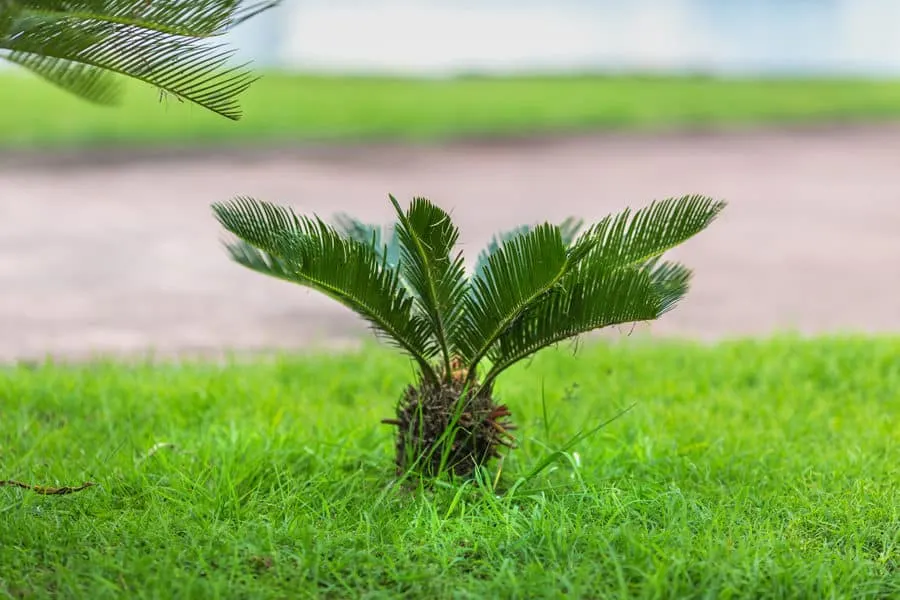
Do you have sago palm trees near your home? Or does your dog walk take you near any sago palms? Sago palm trees are extremely toxic to dogs, and ingesting any part of the plant can be fatal to your dog.
These palm trees, for all their beauty, are so toxic–and, in so many destinations, so common. Many homes and businesses across Texas feature them, and they’re especially common the closer you get to the coast. We even see them on the grounds of dog-friendly hotels, which is really frightening.
These palms are low-rise plants, and can even sometimes be found potted. You’ve no doubt seen them in one size or another:

If you have sago palms near your home–or you might run across them on your day trips or travels with your dog, please be sure to read this story sent to us by Tampa’s Keene Veterinary Hospital:
Paula Tatgenhorst, who had been living in Tampa for only nine months after relocating from St. Louis, Missouri for a new job opportunity. Her three rescue dogs, Bella, Boomer and Cindy had made the trip to the Sunshine State with the rest of her family.
On a warm day in March, Paula decided to do some spring gardening, which involved her replanting two seeds from a plant in her front yard into a pot on her pool patio.
Hours later, she found Bella playing with one of the walnut-size seeds.
Paula, not being a Florida native, did not realize the seed posed a tremendous amount of danger. She did what any pet parent would do: took the seed away, not knowing Bella had swallowed the second one.
Within hours, Bella began vomiting severely. Paula rushed her to Keene Veterinary Hospital in Tampa, where Terrence S. Keene, DVM began treatment. A neighbor provided a photo of the plant, and Dr. Keene quickly identified the culprit as the Sago Palm.
“The entire plant, including seeds, root ball, and leaves are extremely toxic,” said Dr. Keene. “In fact, roughly 75 percent of animals who ingest this plant suffer liver failure and do not make it, even when treated with aggressive veterinary care. What makes the situation even worse is that the seeds are very tasty to dogs.”
Bella was put on IV fluids, administered potent medication and received 24-hour care. She survived throughout the night and was able to return to her home the following day. But sadly, Bella’s prognosis is still not good.
Because the poison is slow-moving, she may be still fighting to survive for weeks, months and years to come. She will undergo routine blood work for months to gauge the level of damage to her liver, which has likely shortened her life.
Despite the fact that the Sago Palm (also known as the Cyad) is poisonous to both pets and children, it is used widely in Florida for outdoor landscaping.
“It is terrifying that this toxic plant was growing right outside our door,” said Tatgenhorst. “It is time we see efforts to improve awareness and increase warnings on the seed and plant labels. It is also imperative that homeowners identify all of the plants in their yards and dispose of the threats properly before it is too late.”
What are the signs of Sago Palm poisoning?
According to the ASPCA, ingestion of the sago palm causes:
- vomiting
- melena (black tarry stools)
- icterus (jaundice)
- increased thirst
- hemorrhagic gastroenteritis
- bruising
- coagulopathy (problems with coagulation of the blood, which puts the pet at risk for excessive bleeding)
- liver damage
- liver failure
- death in pets
What should you do if your dog might have eaten Sago Palm?
If you suspect your pet has ingested any part of this plant, please contact your veterinarian immediately. Time is a key factor in saving your pet’s life.
For additional information, visit aspca.org or call the ASPCA Animal Poison Control Center at 888-426-4435.
Please share this article with your dog-loving friends. Many, many people are unaware of the danger of this common landscaping plant!
- Review: Jimmy BX7 Pro Anti-Mite Vacuum Cleaner - December 16, 2024
- 🎉 GIVEAWAY: Lord of the Pets Portrait of Your Dog! - November 26, 2024
- Review: Lord of the Pets Portraits - November 17, 2024
